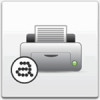Lexmark Dot Matrix Technical Reference - Page 137
Creating the Character Data, Compressing the Character, Initializing the Download Area, TM symbol is
 |
View all Lexmark Dot Matrix manuals
Add to My Manuals
Save this manual to your list of manuals |
Page 137 highlights
Creating the Character Data Each dot-column is sent to the printer as three bytes of data. To get the values of this data, convert the binary values to hexadecimal values. First byte of data (most significant byte) Second byte of data Third byte of data (least significant byte) Top 8 print wires Middle 8 print wires Bottom 8 print wires The figure shows the hexadecimal value for each byte in each column of the character. For example, the first byte of column one is binary 0011 1100 or 60, x3C. Compressing the Character To make a compression mask, set the mask bit for each column (which is identical to the column to its left) to one. Note that only 39 columns can be compressed. The grid on page 136 shows that column 40 is the same as column 39; however, column 40 must be stored. Therefore, compression mask bit 40 is set to zero. Next, convert the binary values to hexadecimal. The compression mask for the TM symbol is x2E74300002. If you use compression, download only dot-columns with mask bits set to zero. Data, with mask bits set to one, is generated by the printer according to the compression mask. Initializing the Download Area Use the following command to initialize the download area: 137 Section 7: Downloading Characters and Fonts















